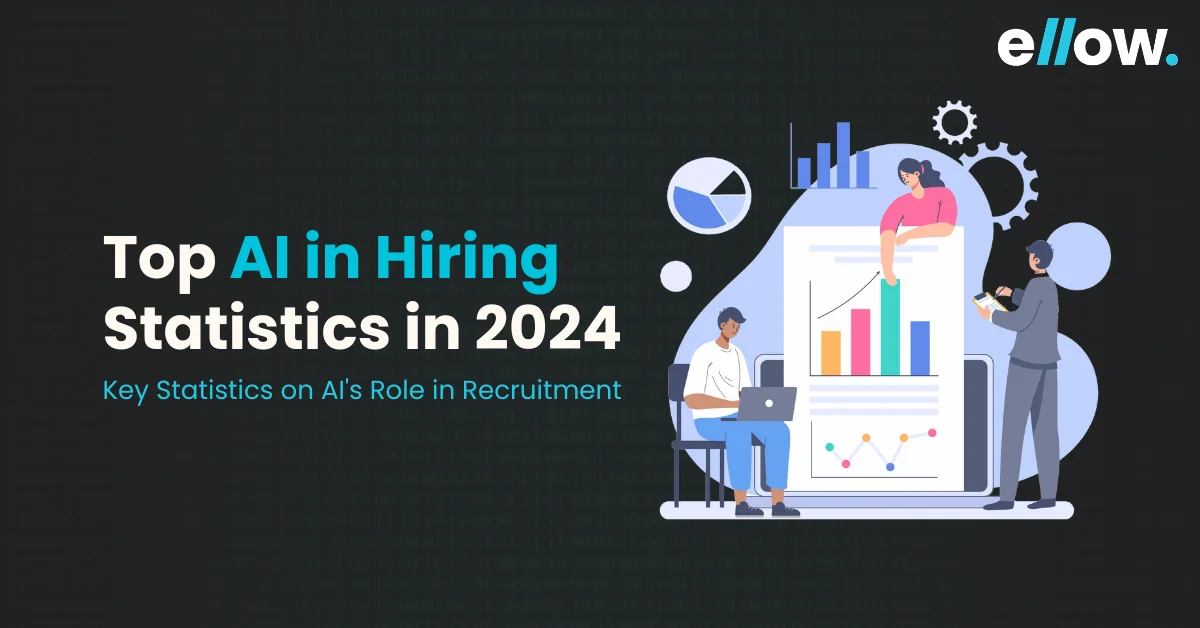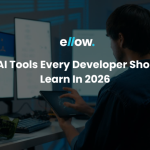Let’s build the future together.
Great ideas need great people. Partner with us to bring your vision to life, or take the first step in your career by joining our team of innovators.

Integrating Artificial Intelligence (AI) into hiring processes has revolutionized recruitment, promising increased efficiency and effectiveness while presenting new challenges and opportunities.
In this article, we will delve into the significant impact of AI on the recruitment sector, drawing insights from reliable sources.
We will examine various aspects including the market’s size and growth, the adoption and utilization of AI tools, their efficacy in expediting hiring processes, and the general perceptions and attitudes towards AI in recruitment.
Moreover, we discuss the concerns and challenges accompanying AI integration, its pivotal role in mitigating bias and fostering diversity, future expectations, and emerging investment and budget allocation trends towards AI in recruitment.
Through this exploration, we aim to comprehensively understand AI’s current and potential future role in reshaping the recruitment landscape, offering valuable insights for employers, recruiters, and job seekers alike.
Market size on a global scale: By 2030, it is anticipated that Artificial Intelligence (AI) will contribute a staggering $15.7 trillion to the global economy. (Source: Sizing the prize)
By 2030, the global AI market is forecasted to reach $1.81 trillion. (Source: Omdia)
As of 2023, the global market size of the AI recruitment industry stands at $590.50 billion. (Source: FnF Research)
Anticipated growth: The enterprise sector of AI recruitment is expected to experience a Compound Annual Growth Rate (CAGR) of 6.17% from 2023 to 2030. (Source: World Economic Forum)
Future market projections: Projections indicate that the global AI recruitment market will surge to $942.3 million by 2030. (Source: FnF Research)
Global Adoption of AI: Since before the COVID-19 pandemic, 88% of companies worldwide have implemented AI technology in their HR operations, which includes recruitment. [Source: SHRM]
AI Integration in Corporations: According to Sage Group, 24% of companies utilize AI for recruiting skilled personnel.
Utilization of AI in Talent Management: As of 2024, McKinsey reports that 60% of organizations employ AI for talent management.
Currently, AI is employed by 35% of businesses. (Source: AuthorityHacker)
While nine out of ten prominent enterprises allocate funds towards AI technologies, only 14.6% have implemented AI capabilities within their operations. (Source: IBM)
Currently, 52% of telecommunications companies employ AI chatbots. (Source: NVP)
Efficiency Gains: According to Tidio, 44% of recruiters and 67% of hiring decision-makers highlight AI’s primary benefit as its capability to save time.
Effective Candidate Sourcing: LinkedIn reports that 72% of recruiters consider AI particularly valuable for candidate sourcing.
Streamlined Hiring Processes: Medium reveals that Hilton managed to slash its time-to-fill positions by 90% through the application of AI.
According to Statista, 35.5% percentage of Companies Allocating Budget for AI and/or Machine Learning-Powered Recruiting Tools Globally in 2018.
The Recruitment Survey Report for Winning Hard-to-Find Talent in 2024 disclosed that 60% of respondents.
63% of individuals are concerned about AI-generated content because of potential biases or inaccuracies. (Source: Authority Hacker)
50% of consumers hold an optimistic view of AI. (Source: Blumberg Capital)
Favorable Influence: According to Tidio, 67% of HR professionals acknowledge that AI positively influences recruitment processes.
Concerns Among the Public: Pew Research Center reports that 66% of U.S. adults express reluctance to apply for jobs where AI is involved in hiring decisions.
Issues of Racial or Ethnic Bias: Pew Research Center finds that 37% of American adults are concerned about the presence of significant racial or ethnic bias in hiring practices.
Neglecting Diverse Skills: Zippia reports that 35% of recruiters express concern that AI might overlook candidates possessing unique skills and experiences.
Apprehension of Job Displacement: The Global CHRO AI Indicator Report highlights that 5% of HR leaders fear being replaced by AI in their roles.
Job Obsolescence Anxiety: CNBC’s findings reveal that 24% of workers are apprehensive about AI rendering their jobs obsolete.
In a survey conducted in February 2023, 33 percent of business leaders in the United States expressed certainty that the adoption of ChatGPT would lead to an increase in layoffs by the end of 2023.
Another 26 percent indicated that this outcome was likely. Furthermore, 32 percent of the respondents estimated that ChatGPT usage would result in more layoffs within the next five years. (Source: Statista)
Twenty percent of HR professionals express concern that AI might perpetuate or even exacerbate biases. (Source: IBM)
Involving gender, age, race, ethnicity, sexuality, disability, or military status, over 60 percent of respondents noted the existence of bias in their workplace. (Source: Deloitte)
A survey conducted by Gartner reveals that merely 12% of HR leaders believe their organization has effectively improved diversity representation.
Mitigating Unintentional Bias: According to Tidio, 68% of recruiters are confident that AI will help eliminate unintentional bias from the recruitment process.
Screening Difficulties: Ideal’s research reveals that 43% of HR professionals consider candidate screening to be the most challenging aspect of their job.
Acceptance of AI in Onboarding: Tidio’s findings indicate that 76% of individuals are open to the idea of being onboarded by AI.
The AI industry is projected to experience a year-over-year growth rate of 30% according to estimates. (Source: Financial Express)
Budget Distribution in SMBs: Statista reports that 35.5% of small and medium-sized businesses allocate funds for AI recruiting tools.
AI Software Investment: MIT Tech Review’s survey of 600 firms reveals that nearly half of them intend to boost their expenditure on data infrastructure and AI by more than 25% in the following year.
Future Outlook of AI: According to Tidio, 79% of recruiters foresee AI making hiring and firing decisions shortly.
Acceptance of AI Decisions: Tidio’s findings indicate that 31% of individuals would consent to AI making hiring decisions independently, while 75% would accept AI decisions if there is human involvement.
Anticipated Role of AI in Recruitment: Tidio reports that 77% of HR professionals anticipate a scenario where human involvement in the recruitment process will become unnecessary.
Advancements in AI and the imperative for a more sustainable future are reshaping employment opportunities across various sectors, leading to a decline in some roles while other areas experience growth. (Source: Statista)
According to a report from Market Research Future, the global AI recruitment market is forecasted to reach $942.3 million by 2030, with an expected compound annual growth rate of 6.9% from 2020 to 2030.
The integration of AI into recruitment marks a significant shift in how hiring is approached, bringing forth both exciting opportunities and notable challenges.
The data underscores the increasing acknowledgment of AI’s significance in the workplace, with numerous companies embracing AI tools to improve their recruitment procedures.
While AI shows promise in expediting hiring processes, mitigating biases, and boosting overall effectiveness, it also presents technical hurdles and raises concerns regarding data privacy and the potential oversight of unique talents.
The future of AI in recruitment holds great transformative potential, with industries progressively allocating resources to leverage its capabilities.
Moving forward, organizations need to navigate these changes judiciously, striking a balance between technological advancements and the human elements of recruitment to foster a more efficient, equitable, and inclusive hiring environment.
AI plays a crucial role in streamlining hiring processes by automating repetitive tasks, identifying top candidates efficiently, and minimizing biases in decision-making.
AI adoption in recruitment is rapidly growing, with a significant number of companies across various industries incorporating AI tools to enhance their hiring processes.
Yes, AI has the potential to mitigate biases in hiring by focusing solely on qualifications and skills, thus promoting a fairer and more inclusive recruitment process.
Challenges include concerns about data privacy, technical complexities in implementing AI systems, and ensuring that AI algorithms do not inadvertently reinforce biases.
The future looks promising for AI in recruitment, with continued advancements expected to further improve efficiency, reduce hiring costs, and enhance the overall candidate experience.

GCC vs Outsourcing vs Remote Teams: What Works in 2026

Vibe Coding vs AI Assisted Coding: The Difference That Will Define the Next Generation…

From Code Generation to Bug Detection: 10 AI Tools Every Developer Should Know in…
Please feel free to share your thoughts and we can discuss it over a cup of tea.
Get a quote
GCC vs Outsourcing vs Remote Teams: What Works in 2026

Six Things to Consider When Hiring Remote Talent

ellow.io enters remote hires market with AI-based screening process